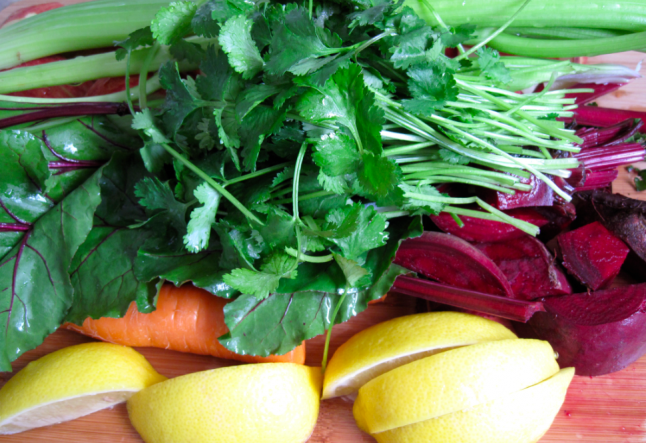eating a plant-based diet

yogic wisdom goes mainstream
Yogis have long identified vegetarianism as the diet of choice, citing a robust list of mind-body benefits ranging from mental acuity to longevity. Science is now catching up, with ample evidence to prove that a plant-based diet decreases stress and improves happiness, while significantly reducing the risk of cancer, heart disease, and diabetes.
The hit documentary film Forks Over Knives and the New York Times bestselling book by the same name catapulted the plant-based dietary model into the limelight. The premise is simple: a whole-foods plant-based diet is optimal for human health and global sustainability. The science is sound, replacing what was once thought to be hippie hyperbole with a comprehensive catalog of facts. It’s hard to argue against a diet proven to save the planet while reducing waistlines and increasing longevity. Even former U.S. President Bill Clinton is onboard, with his personal stats exemplifying the remarkable effects of a plant-based diet taken up at any age.
What is a Plant-Based Diet?
A true plant-based diet is comprised of whole (or minimally processed) plant foods, including fresh fruits and vegetables, tubers, nuts, seeds, grains, and legumes. This means that foods must be eaten in their natural state, or in a close derivative thereof. Stone ground oats, for example, are considered minimally processed, whereas instant oats are not. Similarly, pre-soaked and rinsed sunflower seeds are an approved delicacy, but refined sunflower oil is prohibited. All animal-based products, including flesh-foods, dairy and eggs, are completely excluded.
The emphasis on whole-foods is key to the diet’s success. A plant-based diet is not license to eat anything and everything derived from plants. Refined substances such as high-fructose corn syrup and fractionated palm kernel oil are as banned as narcotics at U.S. border crossings. Vegetarians on a less restrictive regimen may be loathe to eliminate favorite indulgences, but doing so makes a plant-based diet nutritionally succeed where ordinary vegetarian diets fail.
Knowledge is Power
Experts agree that a plant-based diet is universally beneficial. Take time to educate yourself on the facts so that you are equally empowered with real knowledge. Start by reading such acclaimed books as The Food Revolution by John Robbins, and The China Study by T. Colin Campbell and Thomas M. Campbell II. Watch powerful documentaries, including the Oscar-nominated film Food Inc., Food Matters, and Forks Over Knives. If you enjoy internet research, go online and view the content posted on well-respected websites. Local plant-based diet community groups have sprung up in many locations and are yet another valuable resource.
Take advantage of modern medicine with a quick trip to your doctor’s office. It is good practice to seek medical advice before starting a new diet, and a physician can conduct helpful lab work and provide targeted guidance. You may also want to consider working with a qualified nutritionist who can provide you with tailored dietary guidelines, meal plans, and recipes, not to mention strong motivation. That said, assembling a support team of professionals is not for everyone. Many happy and healthy converts have achieved outstanding results with a bit of good homework and dedication.
Making the Change
When it comes to dietary change, the mantra is “slow and steady wins the race”. A radical dietary switch based on enthusiasm rarely leads to long term success. Be the turtle and take three to six months to transition onto a healthy plant-based diet while developing the habits and skills to stay there for a lifetime. The hare will switch cold turkey for three months (and make this widely known to anyone who will listen) only to quietly revert back to old habits when the novelty fades.
Consider the following three month plant-based diet transition plan as a sample model:
Month One
Eat food of all currently consumed types (e.g. plant-based, flesh-foods, etc.), but only in a whole-food state. Eliminate all fried foods and instead select foods that are grilled, boiled, baked, steamed, or raw. Eliminate refined sugars and artificial additives. Minimize dairy.
Month Two
Limit any animal-based foods to chicken, fish, shellfish, and eggs. Increase consumption of fruits, vegetables, grains and legumes. Continue to eat only whole foods. Eliminate dairy.
Month Three
Transition to a balanced plant-based diet that includes a healthy diversity of fruits, vegetables, grains, legumes, nuts, and seeds.
Individuals on a Standard America Diet (SAD) will want to transition at least this slowly to facilitate sustainable change. When the body has been compromised by past suboptimal food and fitness choices, it is at a disadvantage for processing out stored fats and chemicals – a natural and beneficial result of a plant-based diet. Too much too fast can translate to organ damage.
Practicing vegetarians can look forward to a more rapid transition. In this case, the task is simply to eliminate refined plant-based foods and dairy. These are small secondary steps after having made the initial vegetarian commitment. Yogis, listen up! While milk products are glorified in many yoga and Hindu communities, they are excluded from a true plant-based diet. If this incites consternation, pause for a moment to consider that the ancient treatises on Ayurveda similarly note the detrimental effects of dairy and strictly limit its consumption.
Coda
Plant-based dietary nutrition has everything going for it, from scientific merit to celebrity. In the next several articles we will discuss concerns common to new and seasoned plant-based diet practitioners while highlighting results-based strategies to maximize success.
Join the conversation! Share your questions and concerns about a plant-based diet as well as your success stories in the comment section below.
You might also like this: plant-based diet nutrition